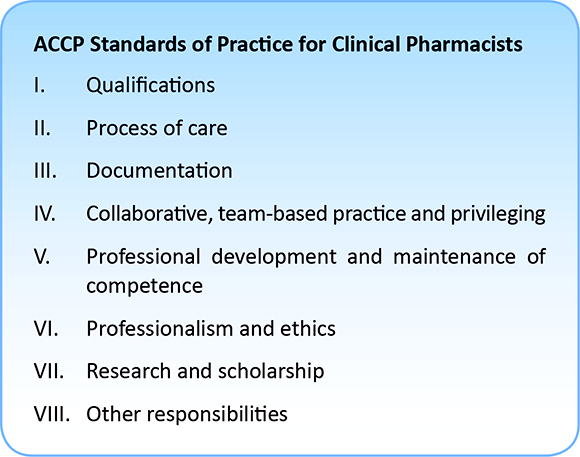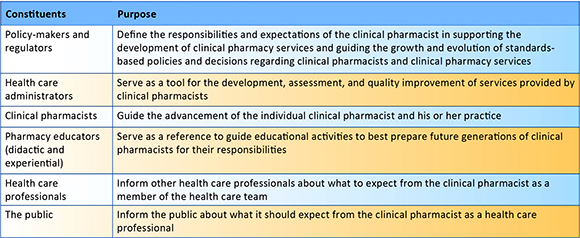Released in March of this year is a key document for all constituents involved in the development and assessment of clinical pharmacy services. The ACCP Standards of Practice for Clinical Pharmacists provides answers to many of the questions frequently posed by policy-makers, administrators overseeing the advancement of clinical pharmacy services, and educators and institutions responsible for the education, training, and development of clinical pharmacists as well as practicing pharmacists.

Eight standards comprise the final document, which delineates the qualifications, responsibilities, practice and privileging, and professional development required of clinical pharmacists.
The first standard defines the qualifications of clinical pharmacists as follows:
Clinical pharmacists are practitioners who provide comprehensive medication management and related care for patients in all health care settings. They are licensed pharmacists with specialized advanced education and training who possess the clinical competencies necessary to practice in team-based, direct patient care environments. Accredited residency training or equivalent post-licensure experience is required for entry into direct patient care practice. Board certification is also required once the clinical pharmacist meets the eligibility criteria specified by the Board of Pharmacy Specialties.
The second standard characterizes the process of care for clinical pharmacists as being composed of four major components. These are:
- Assessment of the patient: The clinical pharmacist assesses medication-related needs.
- Evaluation of medication therapy: The clinical pharmacist identifies strategies for optimizing medication therapy.
- Development and implementation of a plan of care: The clinical pharmacist develops and implements, collaboratively with the patient and his or her health care providers, a plan for optimizing medication therapy.
- Follow-up evaluation and medication monitoring: The clinical pharmacist performs follow-up evaluations in collaboration with other members of the health care team to continually assess patient outcomes.
The Standards further delineate the above four components, providing specific activities that comprise the achievement of each.
The Standards articulate ACCP’s expectations of clinical pharmacists both within the United States and around the world where clinical pharmacy is emerging. The table below summarizes suggested uses of the Standards, by constituents.
Table. Suggested Purposes of the Standards, by Constituents

ACCP President Gary Yee commented that the Standards “represent a formal commitment by our discipline to assume shared responsibility with other members of the health care team for optimizing patients’ pharmacotherapy outcomes.”
A pre-publication copy of the Standards is available at http://www.accp.com/docs/positions/guidelines/standardsofpractice.pdf.